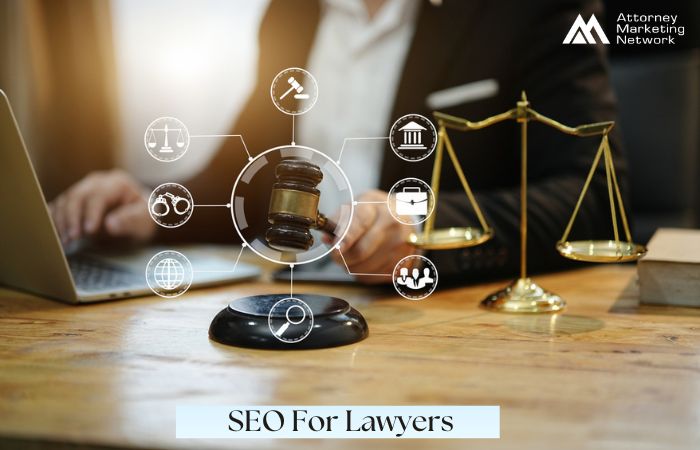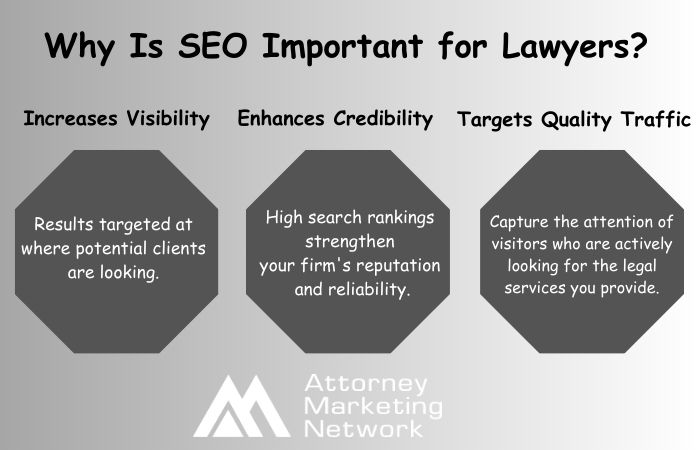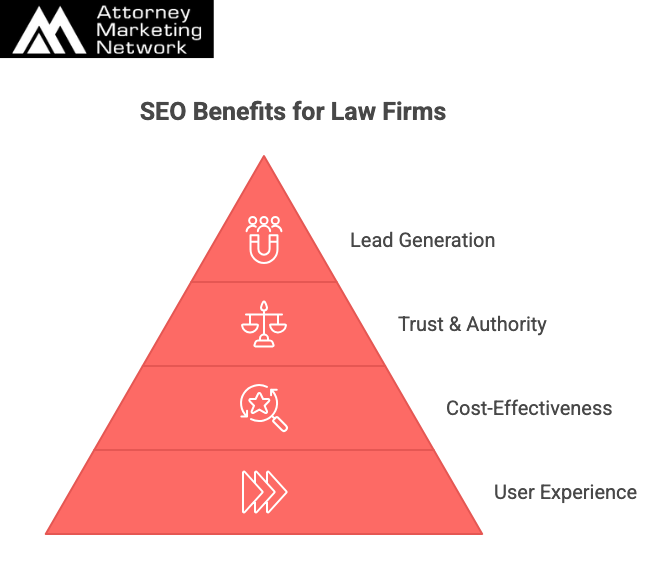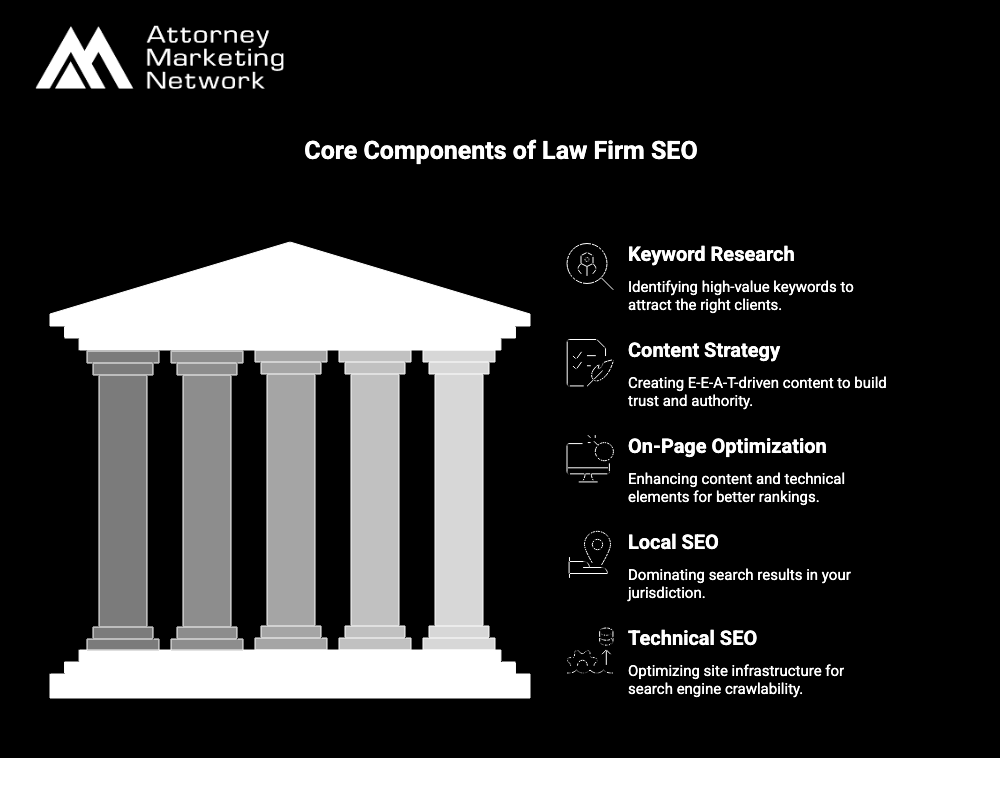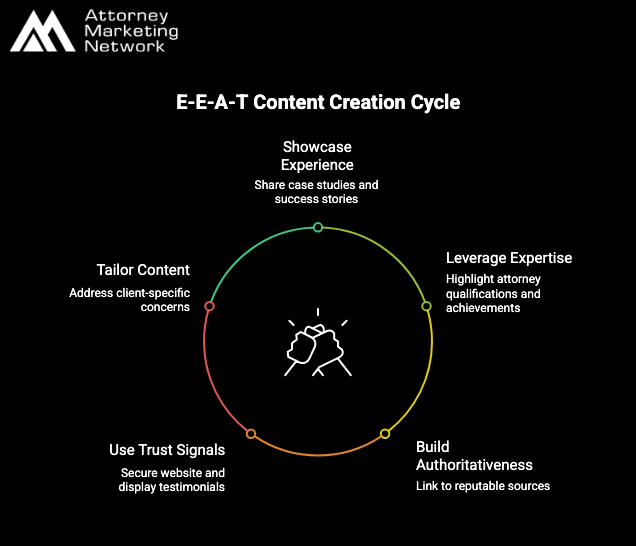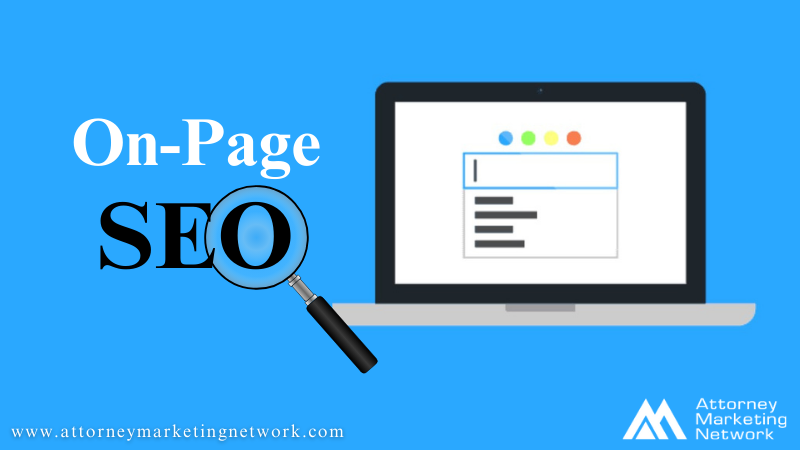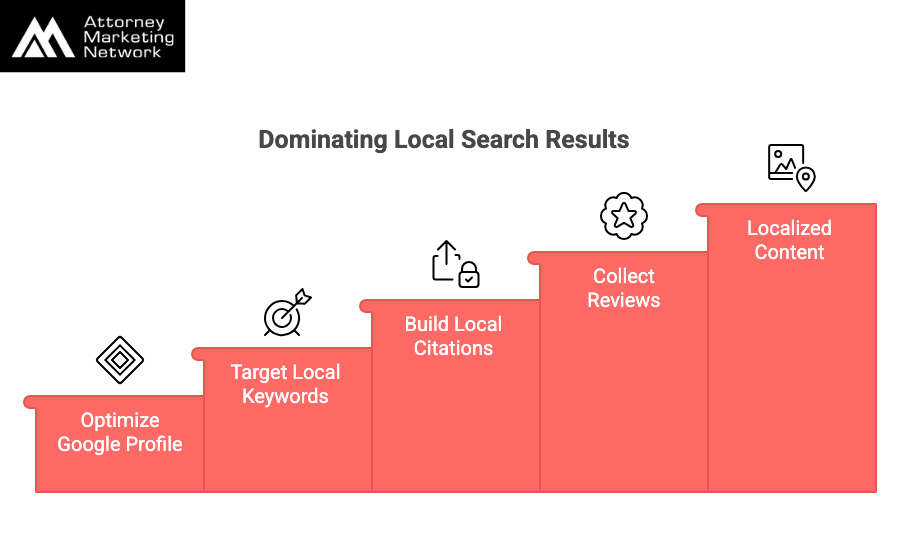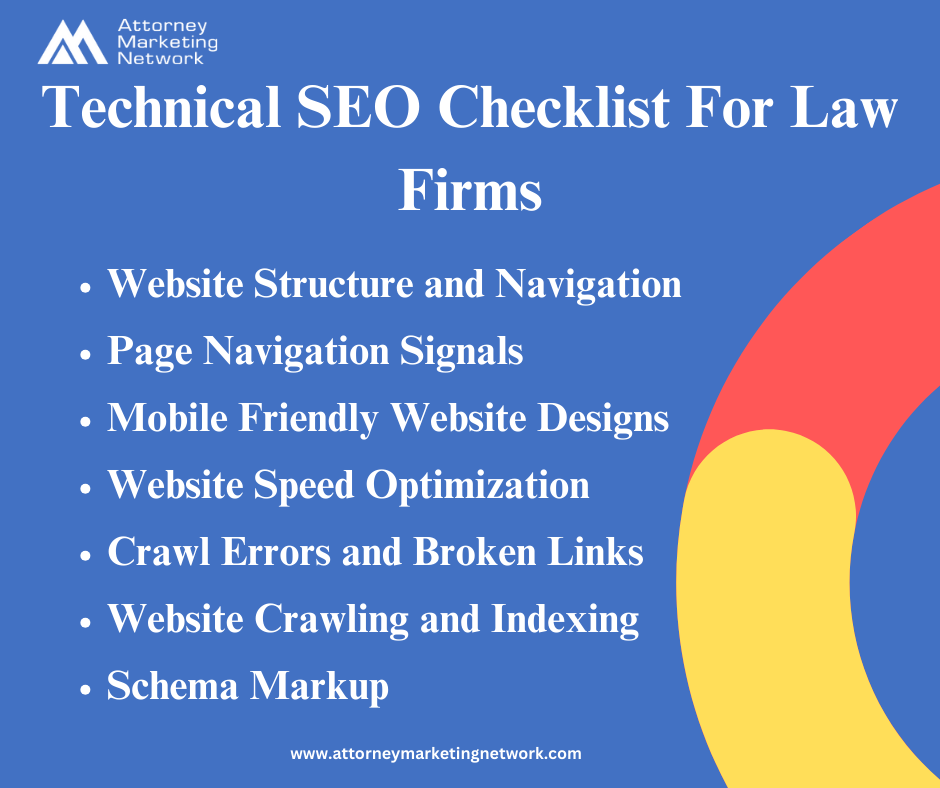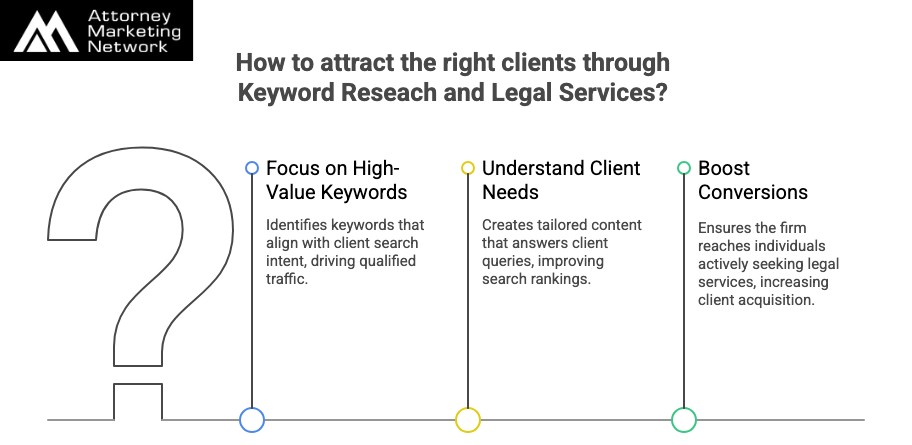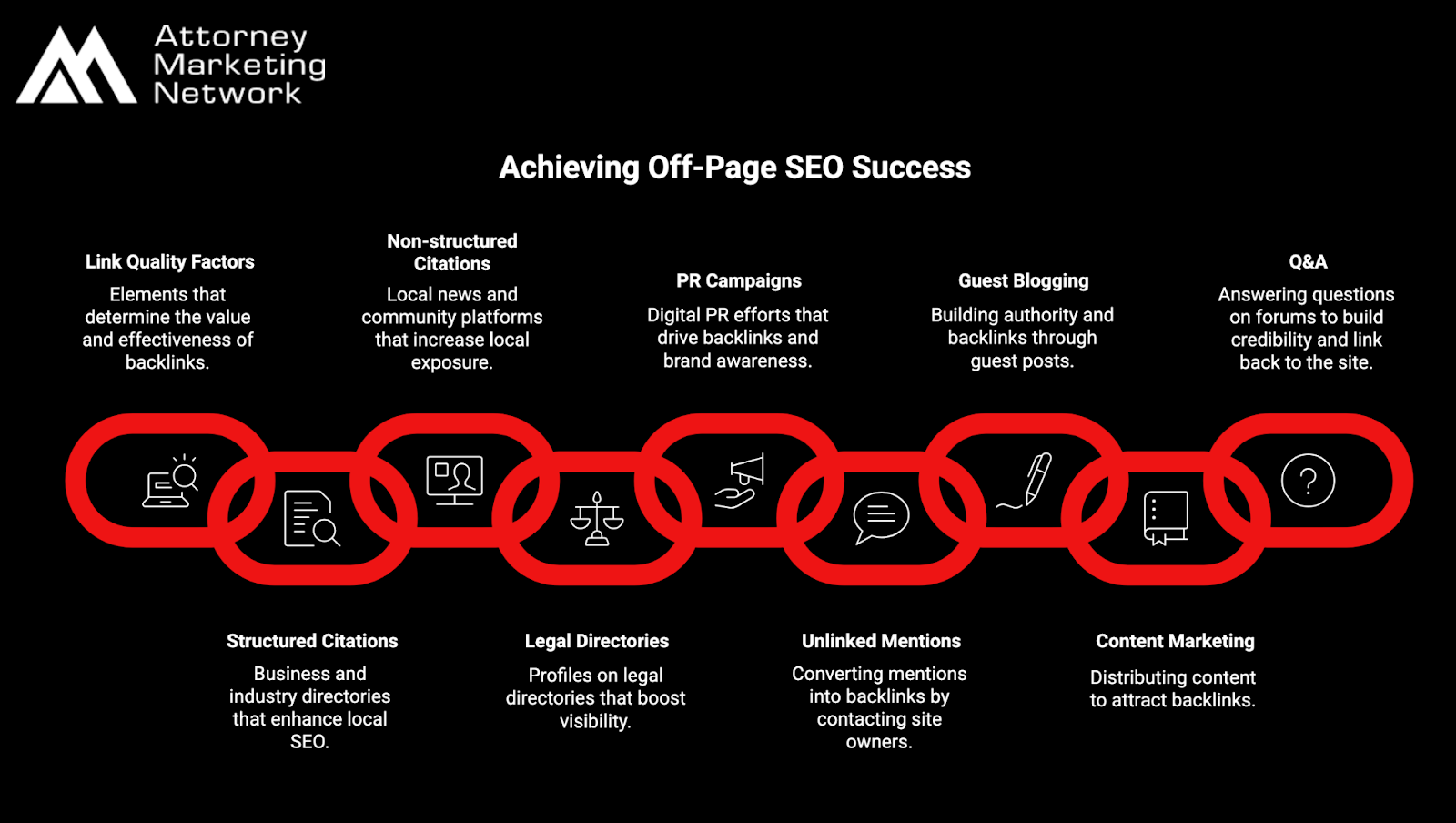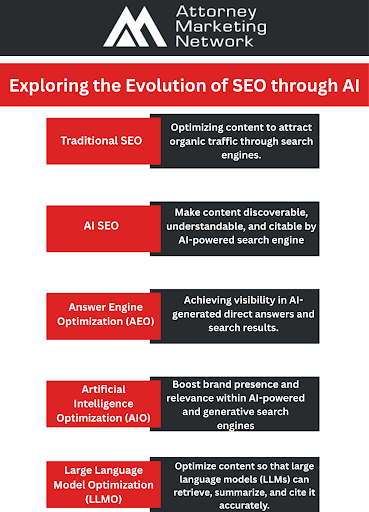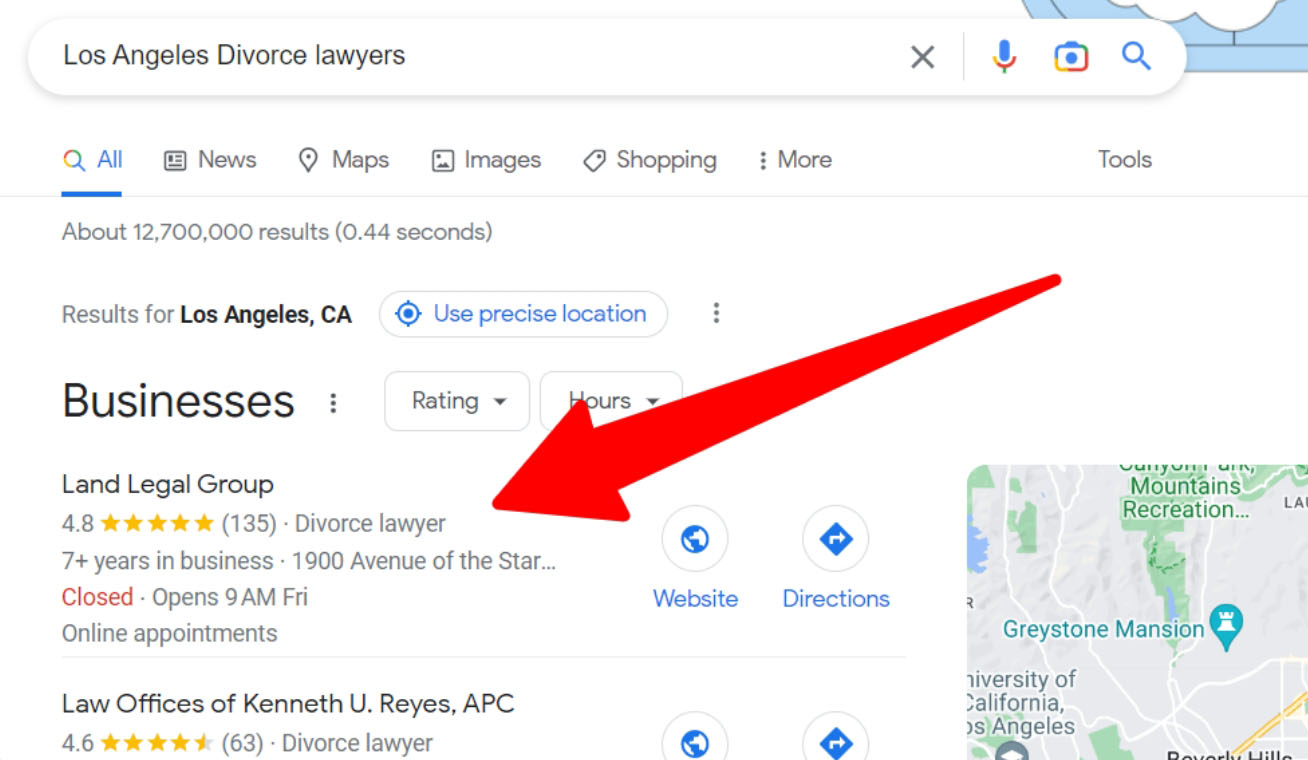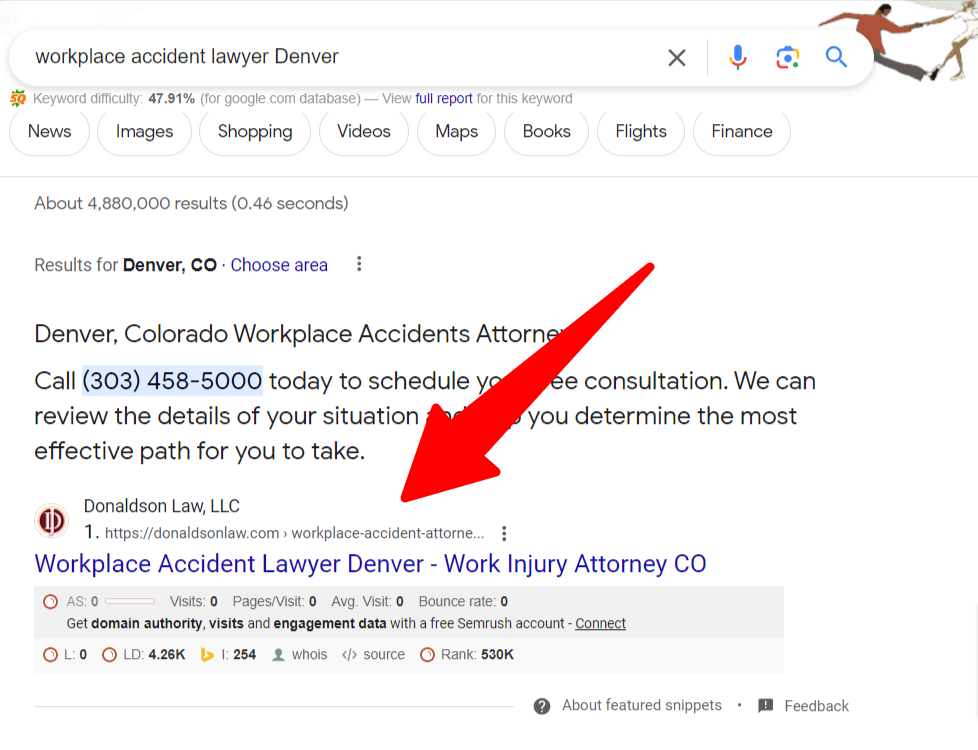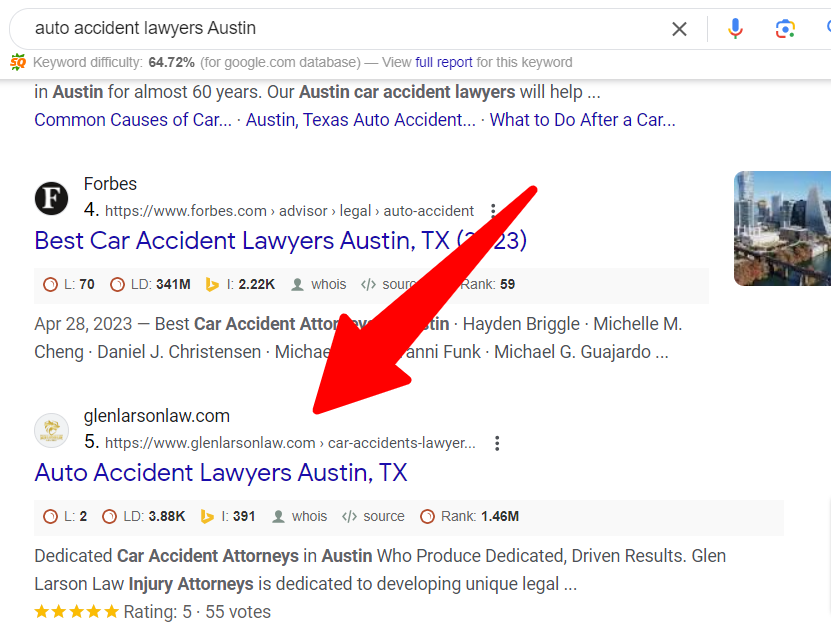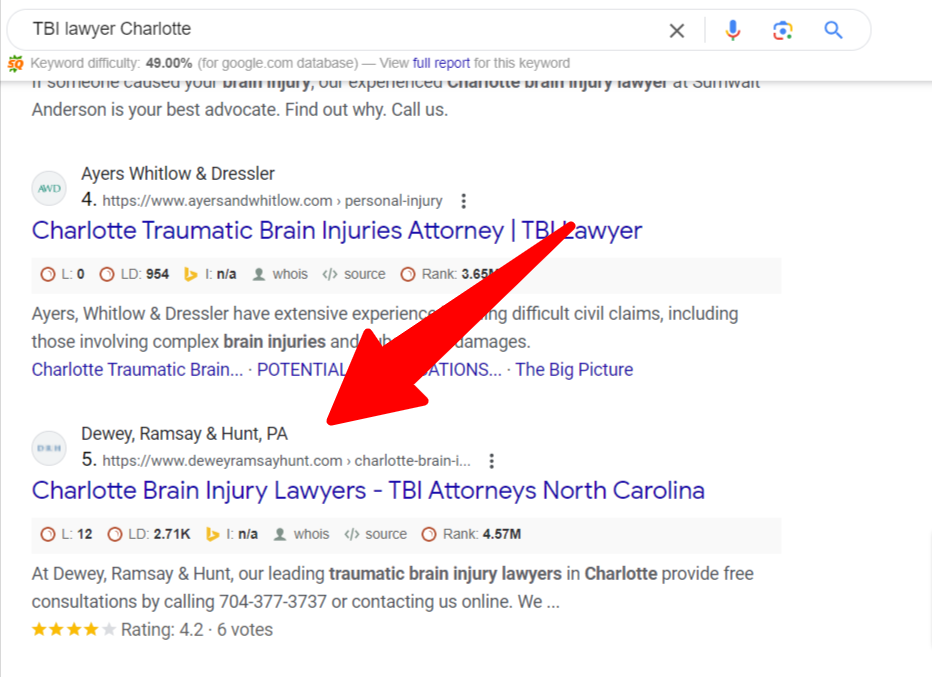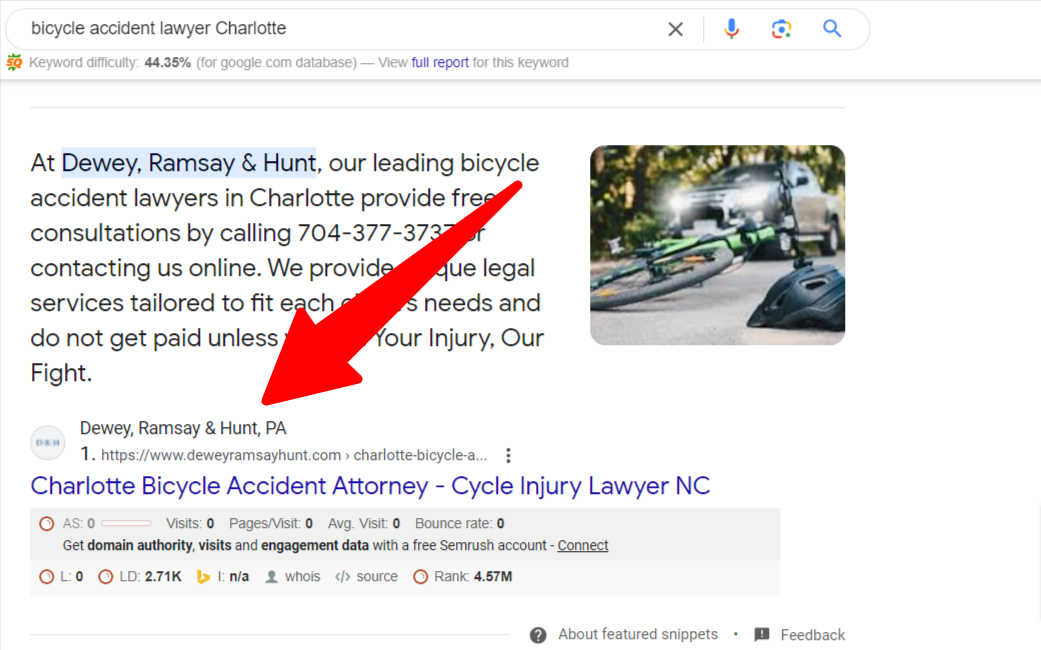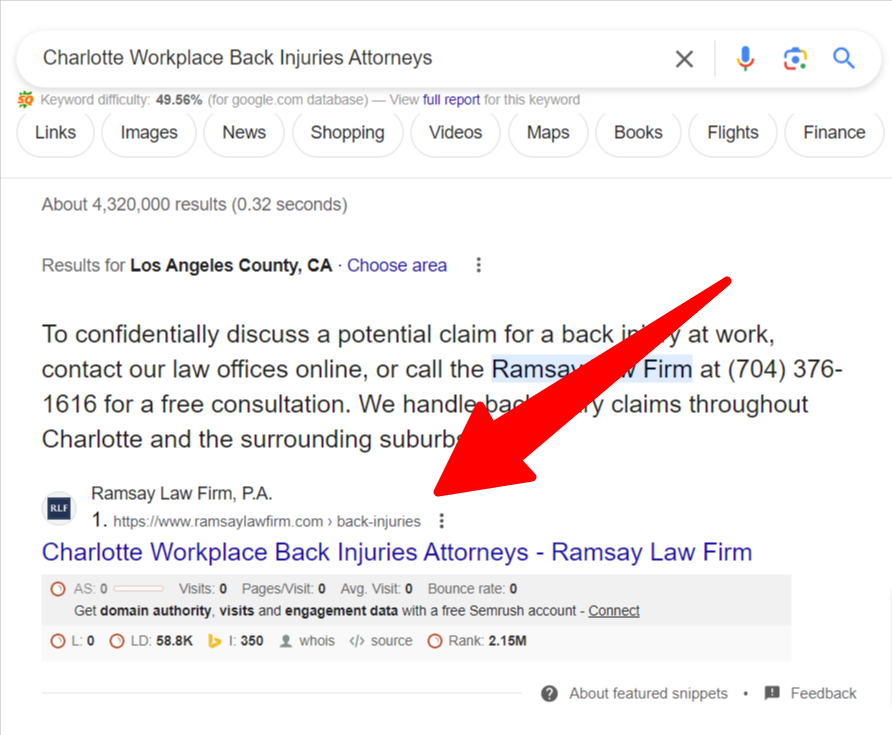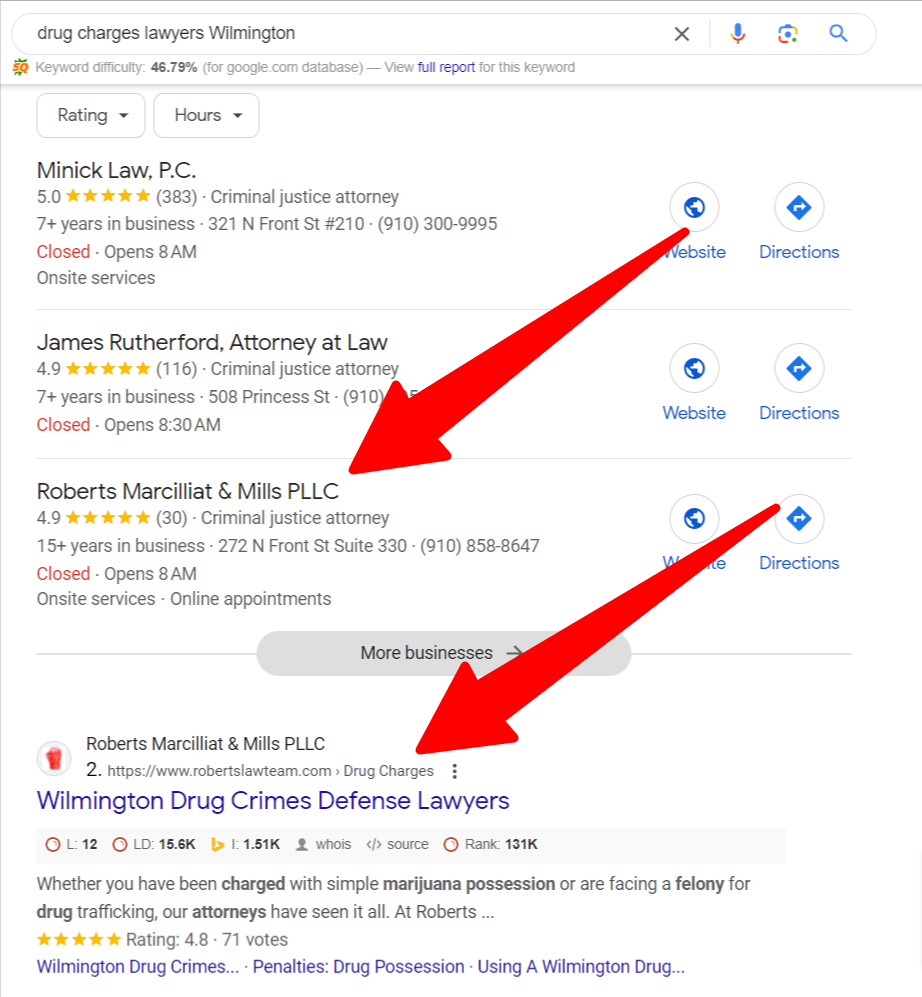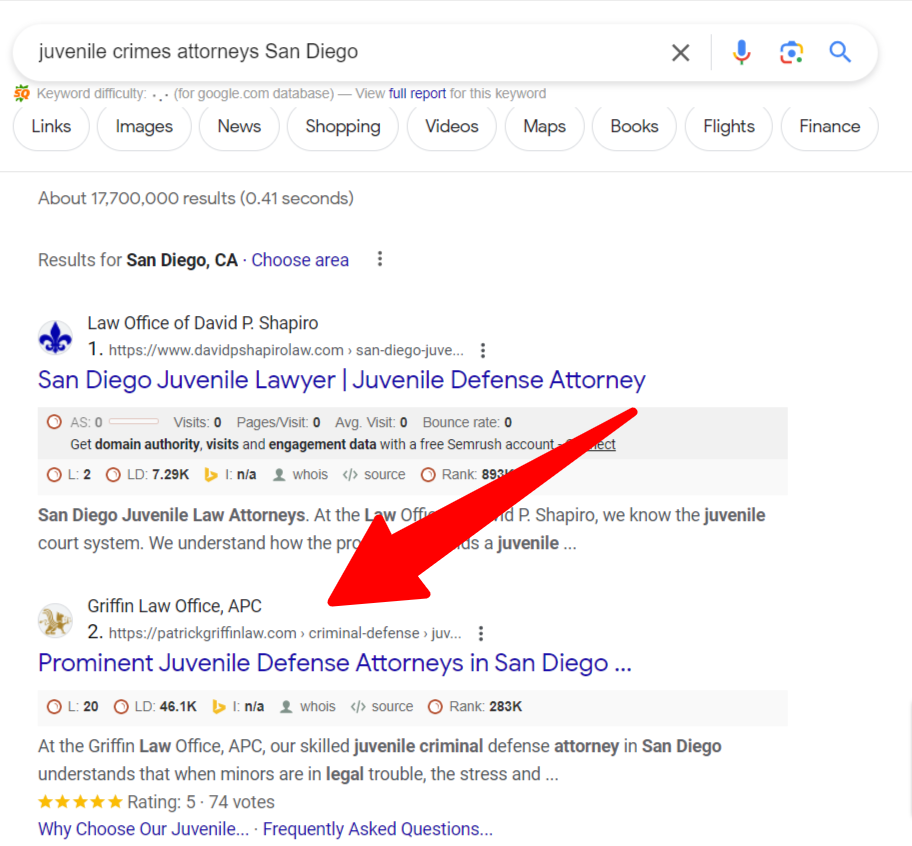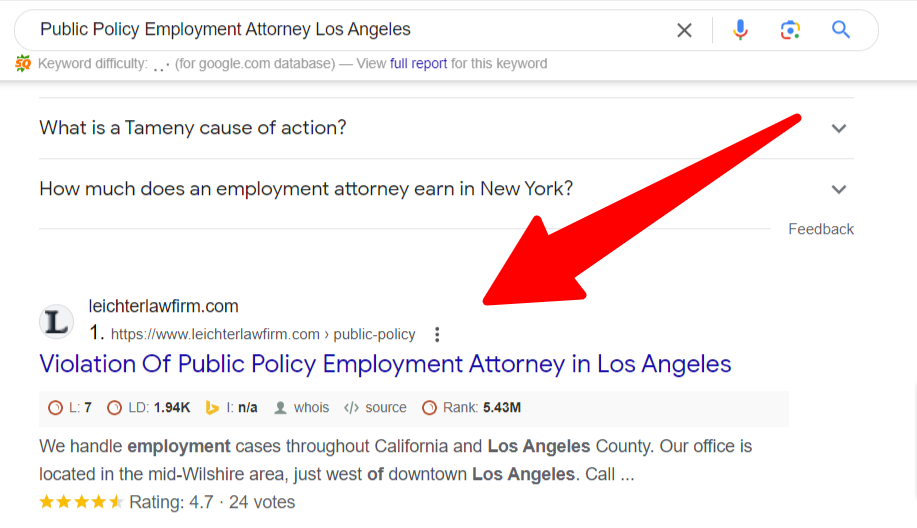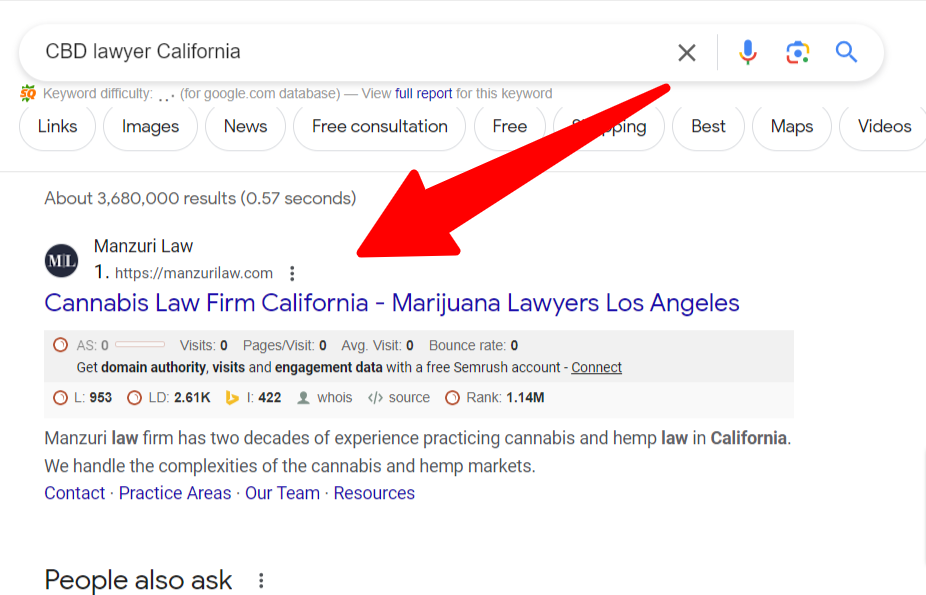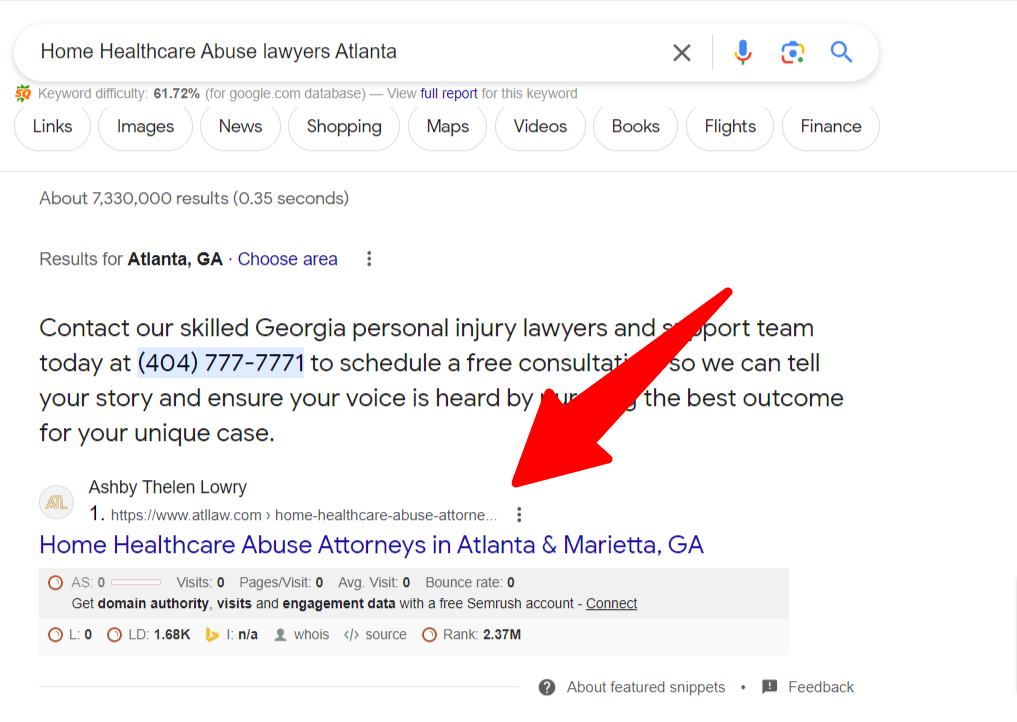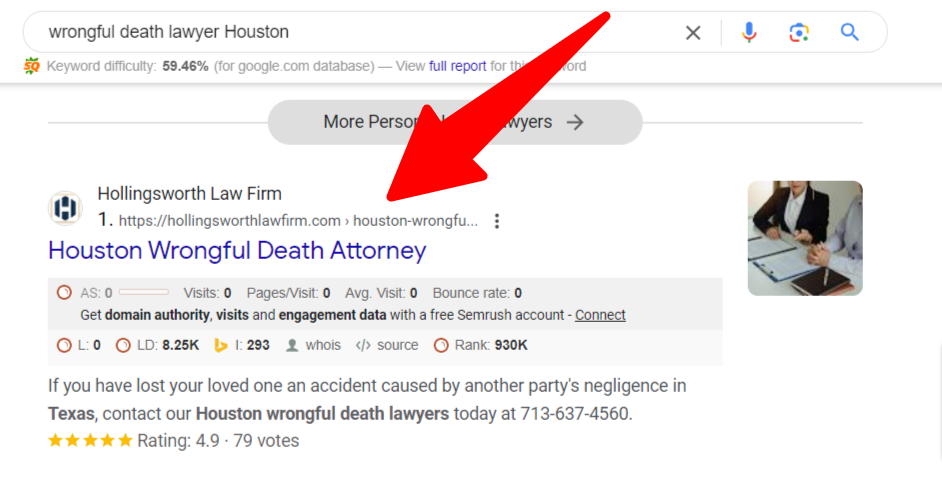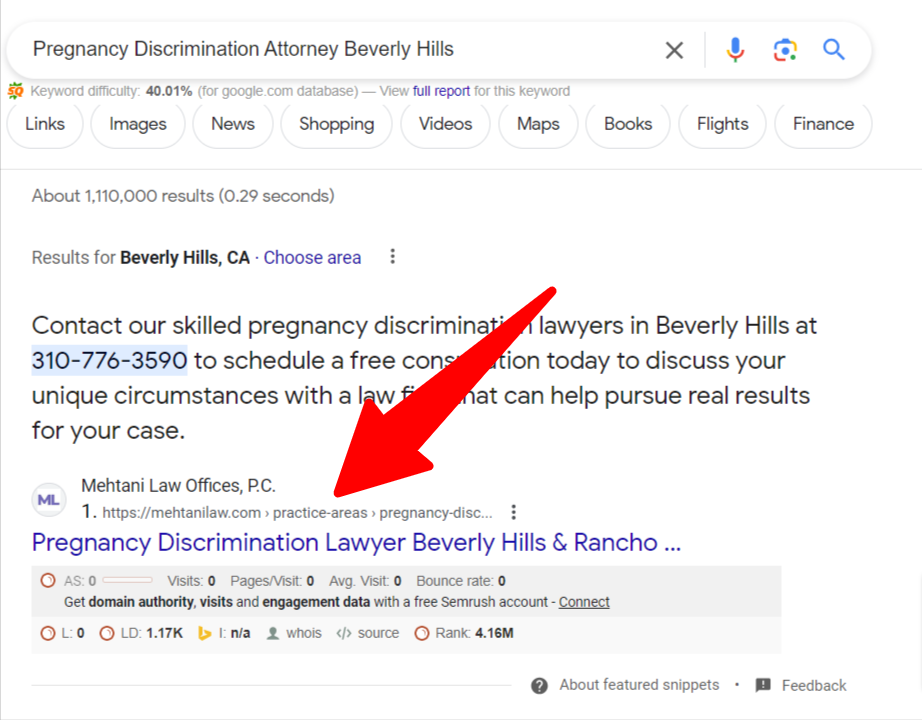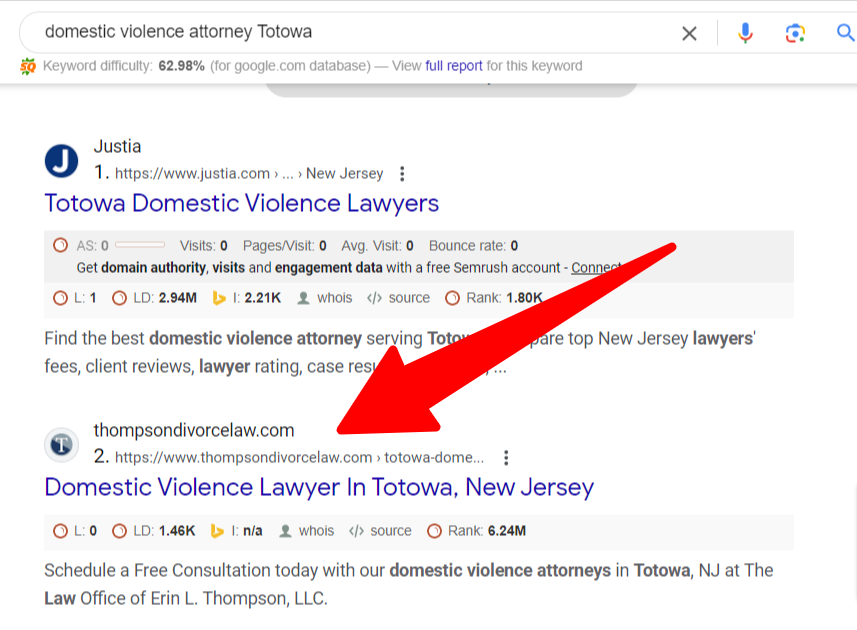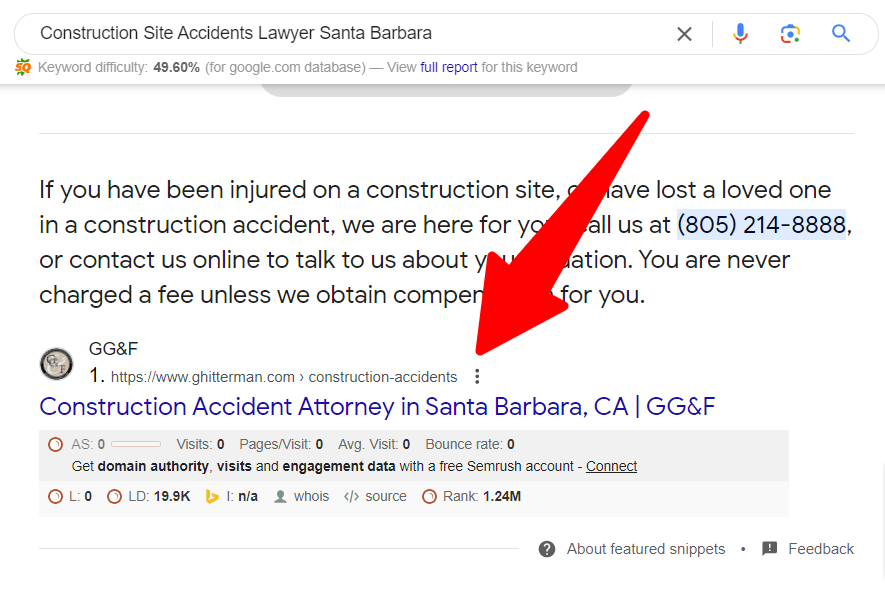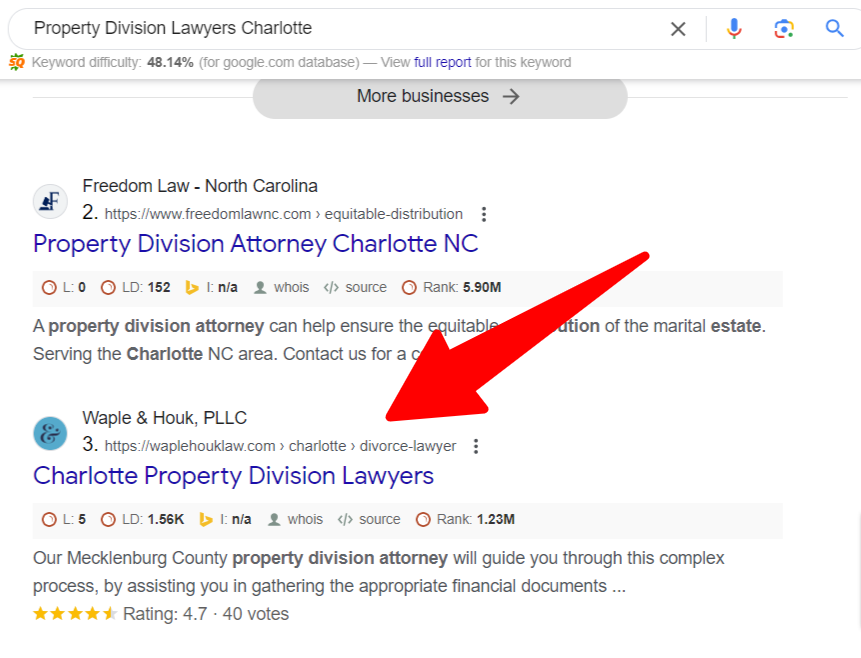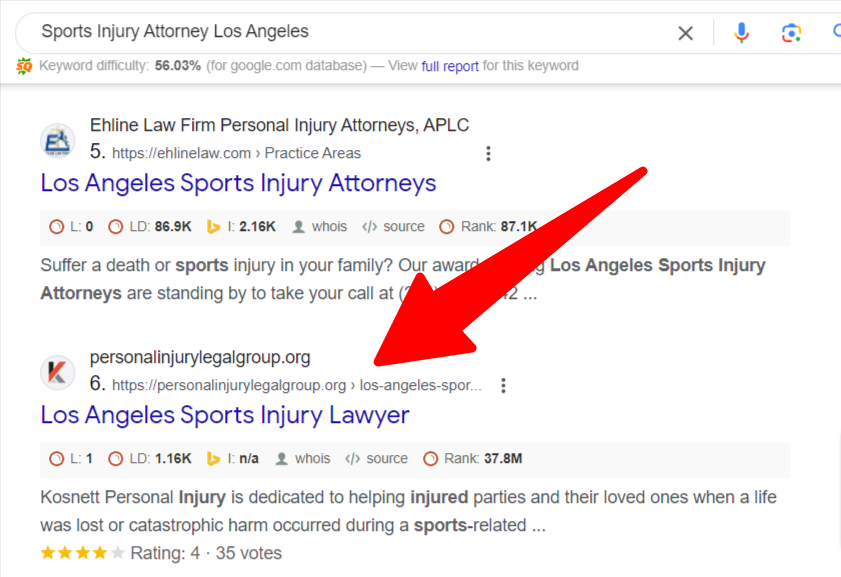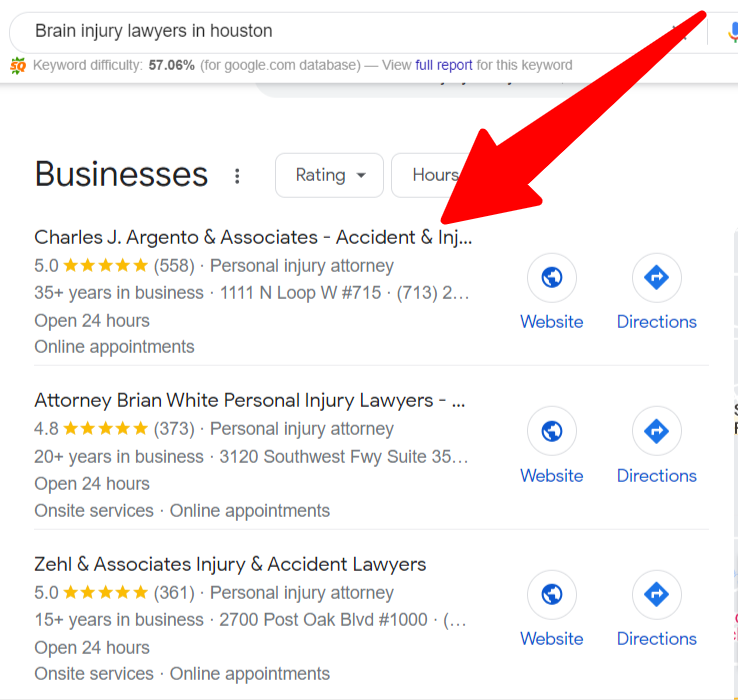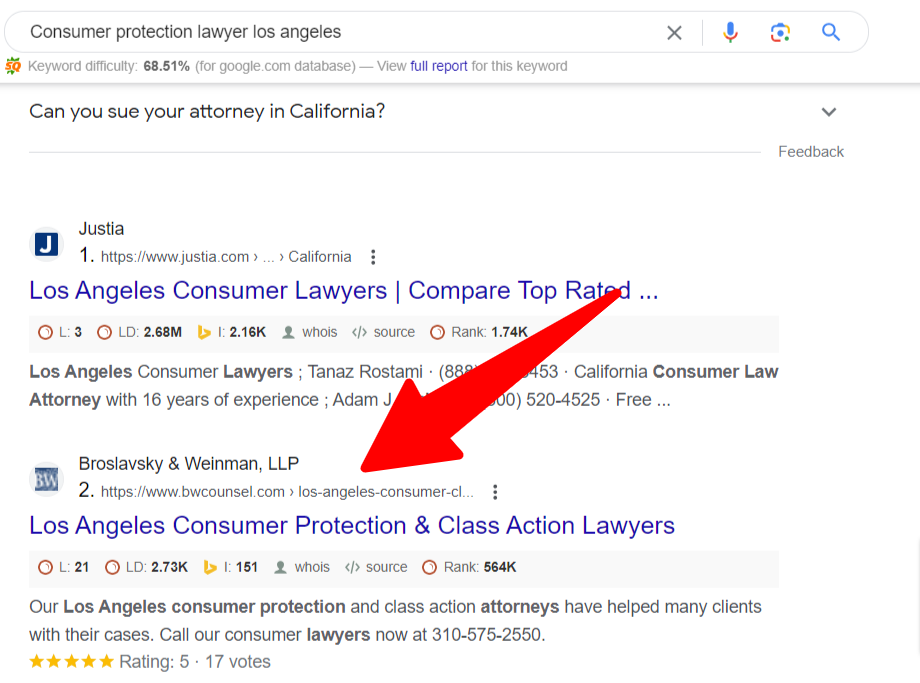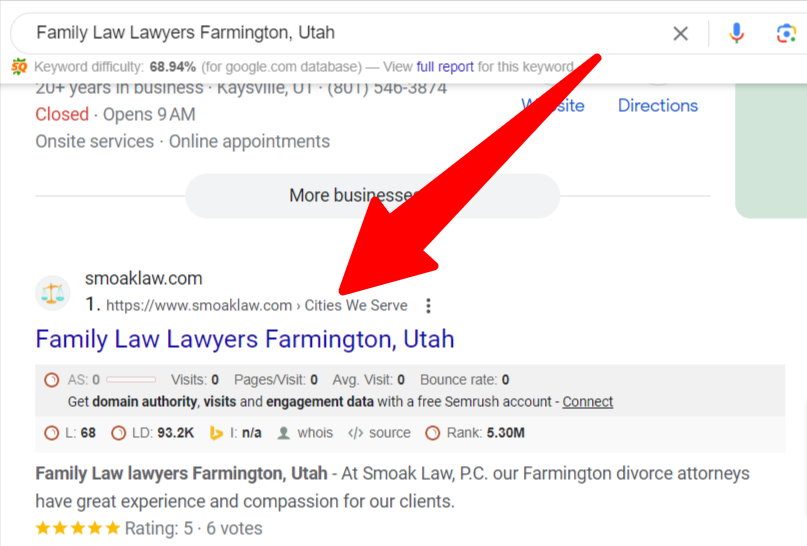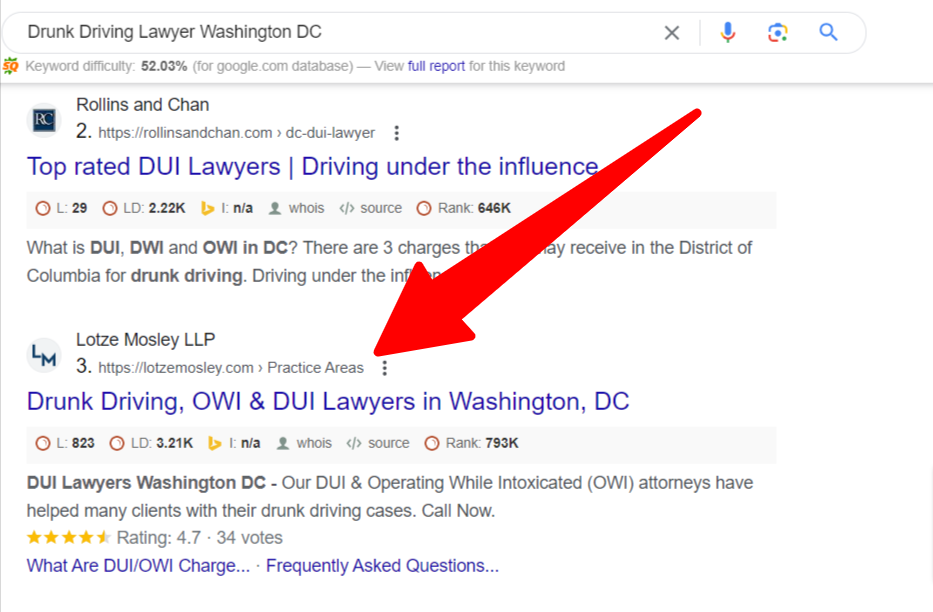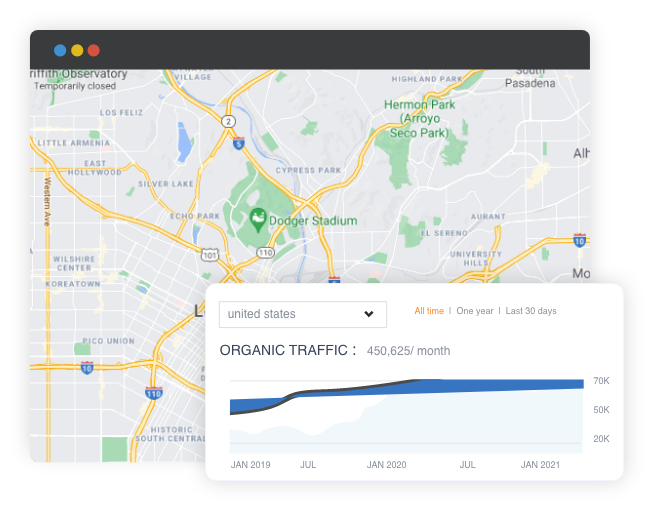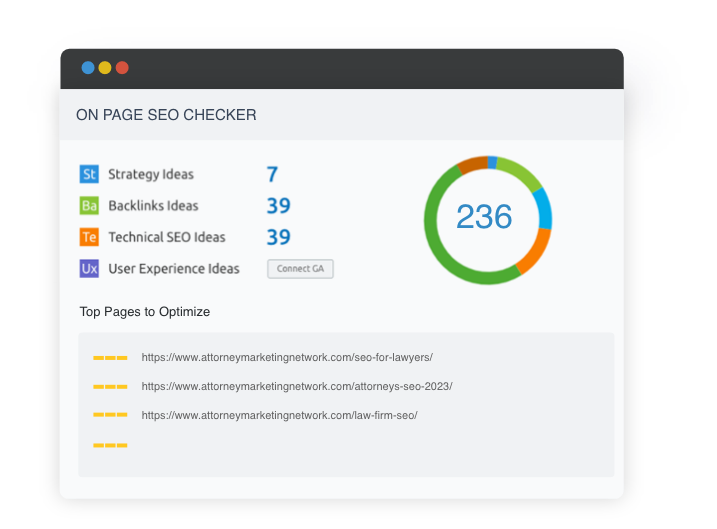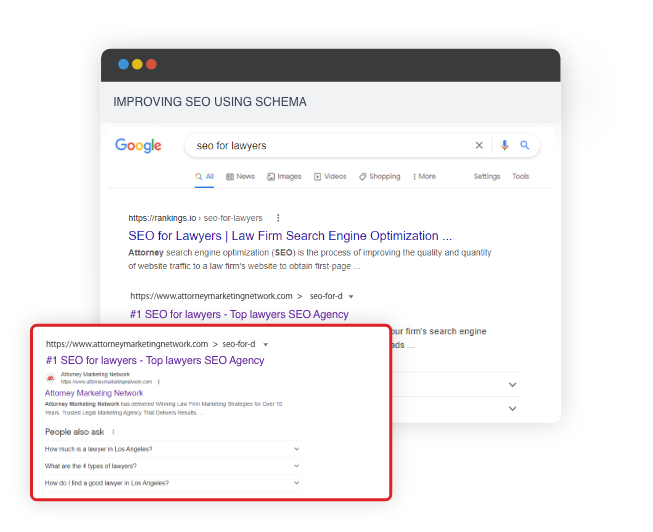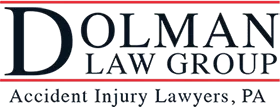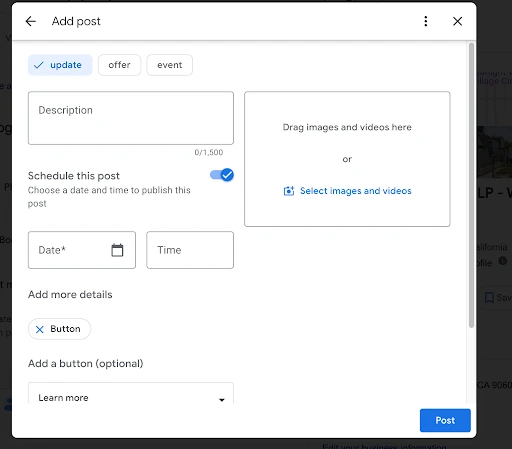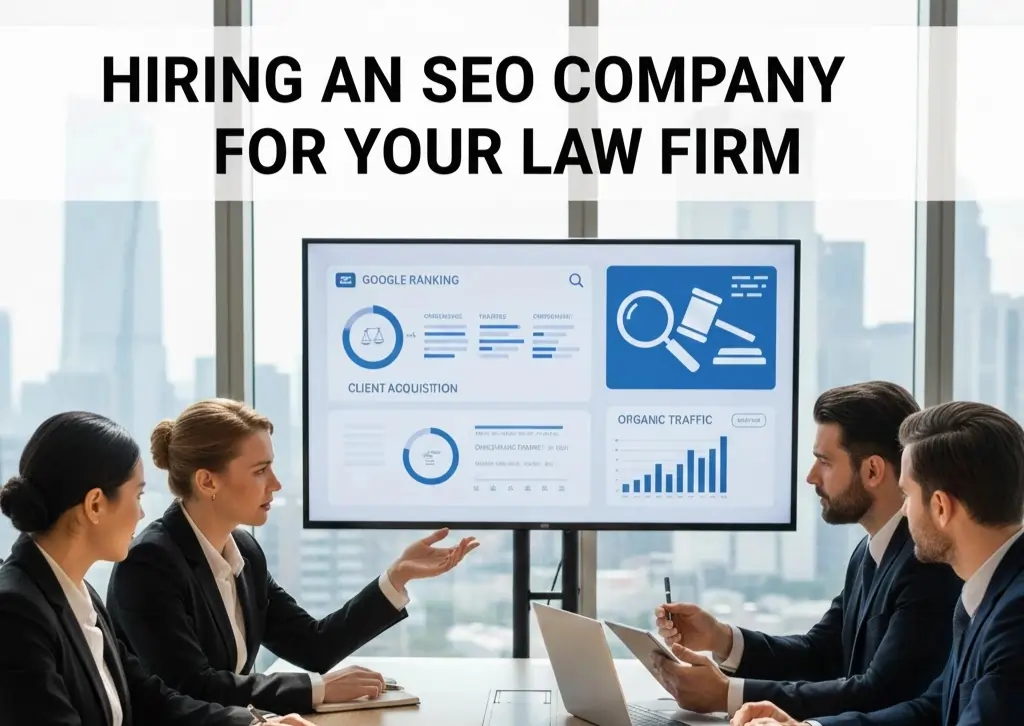What is SEO for Lawyers?
Search engine optimization (SEO) for lawyers involves specific strategies and tactics to enhance a law firm’s website for visitors and increase its visibility and ranking in search engine results. It’s about making it easier for potential clients to find your law firm website when searching for legal help online.
Effective law firm marketing through SEO is crucial for improving visibility and building credibility, driving more traffic, and generating potential leads for your law firm’s website. Attorney Marketing Network is dedicated to helping law firms leverage these strategies for greater success.
Why Law Firm SEO is Essential for Your Practice Growth
Lawyers need SEO because it helps them establish an online presence, attract potential clients, and grow their business. Ranking for highly competitive keywords in the legal industry can be challenging, as many lawyers and law firms lack expertise in implementing SEO campaigns.
Most law firms hire an SEO agency specializing in legal services marketing to ensure they achieve the best possible results from their SEO efforts.
Here are a few key reasons why SEO is more important than ever for law firms in 2025–2026:
Law firm SEO is essential for online visibility, attracting clients, and growing your business. Due to its complexities, many firms turn to SEO agencies specializing in legal marketing.
- Online Search Behavior
96% of people use search engines to find legal help, with Google as the primary tool. Additionally, 76% of local searchers visit a business within 24 hours, highlighting the need for local SEO. - Client Acquisition Impact
Law firms with optimized websites see 60% more organic traffic, leading to higher lead generation. Organic search has a conversion rate of 14%, far outpacing paid ads at 1-2%. - Cost-Effectiveness
SEO is a more cost-effective long-term strategy than PPC, offering sustainable, cheaper traffic. Law firms investing in SEO often see a 400% ROI due to low maintenance costs. - Trust and Credibility
70% of users prefer organic search results, which boosts credibility and trust. Law firms with strong SEO tend to have better reviews, further enhancing client trust. - Mobile & Voice Search Trends
Over half of web traffic comes from mobile devices, making mobile optimization essential. Voice search also accounts for 30% of browsing sessions, requiring SEO strategies to adapt to natural language. - SEO Metrics and Performance
Tracking key metrics like organic traffic and session duration helps firms adjust SEO strategies, ensuring top rankings and ongoing visibility.
SEO Success: Achieving the #1 Ranking for "Los Angeles Divorce Lawyers"
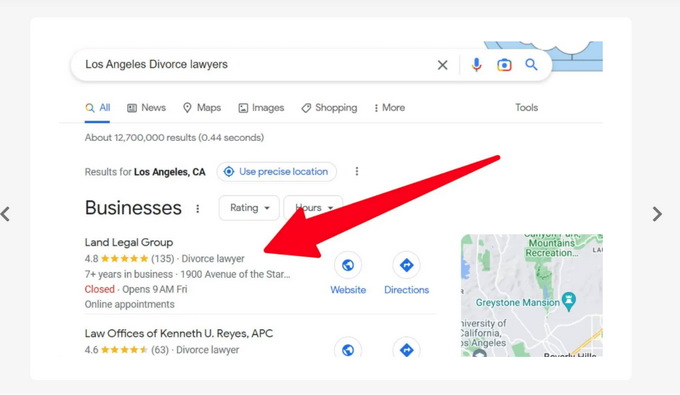
Our client, Land Legal Group, secured the top position in Google’s local pack search results for “Los Angeles Divorce Lawyers,” achieving a 4.8-star rating from 135 reviews. We enhanced their online visibility, credibility, and client engagement through strategic SEO efforts by optimizing their Google Business Profile, managing client reviews, and implementing keyword-focused content strategies. This achievement demonstrates the effectiveness of our SEO services in helping legal professionals establish a strong presence in search engine results.
Key Benefits of SEO for Law Firms
Search Engine Optimization provides law firms with a powerful, sustainable way to enhance their online presence, attract potential clients, and maintain a competitive edge in the legal market. Effective legal marketing goes beyond simply showing up in search results; it’s about building a predictable pipeline of qualified cases.
- Attract More Qualified Leads and High-Value Cases: SEO enables attorneys to increase visibility within search engines, helping them connect with potential clients actively searching for legal services. Unlike outbound marketing, SEO captures “intent-based” traffic, users who already have a legal need and are looking for a solution right now.
When your firm is easily discoverable for specific queries like “how to fight a speeding ticket,” clients are more likely to find your website and contact you through platforms like your Google Business Profile, significantly boosting the chances of client acquisition.
- Build Trust, Credibility, and Authority: In a field where trust is paramount, a high ranking in search engine results enhances your firm’s reputation. Appearing at the top of search results projects expertise, credibility, and authority in your field. This instills the confidence a prospective client needs to trust you with their critical legal matters.
Effective legal marketing strategies focus on demonstrating expertise (E-E-A-T) through valuable content, which builds inherent trust with potential clients before they even pick up the phone.
- A Cost-Effective, Long-Term Marketing Strategy: Compared to paid advertising methods such as Google Ads and Facebook ads, SEO offers a more cost-effective, long-term strategy. While PPC provides quick visibility, organic SEO builds an asset that generates value over the years.
With the right SEO efforts, attorneys can attract consistent organic traffic without recurring advertising costs, making it a more sustainable and predictable marketing approach with a higher long-term return on investment (ROI).
- Enhance the Overall User Experience (UX): SEO isn’t just about search engines; it’s also about the human user experience. Optimizing for search engines inherently improves website structure and content presentation, leading to a smoother user experience (UX).
A well-optimized site ensures faster load times, mobile-friendliness, and easy navigation, all of which encourage users to stay longer, digest your content more easily, and ultimately convert into new clients. This positive experience signals site quality to Google.
Core Components of a Successful Law Firm SEO Strategy
A strong SEO strategy is essential for law firms that want to stand out online and attract qualified clients. Effective SEO for lawyers goes far beyond adding keywords to web pages. It requires a comprehensive approach that aligns multiple moving parts, including keyword research, content strategy, on-page and off-page optimization, local search visibility, and technical performance.
At Attorney Marketing Network, we help law firms bring these elements together into one cohesive strategy. Our team focuses on improving search rankings, driving high-quality website traffic, and turning online visitors into real clients.
Keyword Research and Intent Targeting for Legal Services
Effective keyword research and intent targeting are essential for attracting the right clients to your law firm. At Attorney Marketing Network, we focus on identifying high-value keywords that align with your clients’ search intent. By understanding the specific needs and questions your target audience has, we create tailored content that answers these queries, drives qualified traffic, and improves your law firm’s search rankings.
Our approach ensures you reach individuals actively looking for legal services like yours, boosting conversions and client acquisition.
Creating E-E-A-T-Driven Content for Prospective Clients
To build a strong E-E-A-T (Experience, Expertise, Authoritativeness, and Trustworthiness) framework for your law firm’s content, focus on the following key strategies:
- Showcase Real-World Experience: Share case studies, success stories, and client outcomes to demonstrate practical experience and real-life legal success.
- Leverage Expertise: Ensure content is created by credible professionals. Highlight the qualifications, achievements, and experience of your attorneys.
- Build Authoritativeness: Link to authoritative external sources such as legal publications, government websites, and reputable media outlets to enhance the credibility of your content.
- Use Trust Signals: Make your website secure (HTTPS), clearly display contact information, and feature client testimonials and reviews to reinforce trust.
- Tailor Content to Client Needs: Address the unique concerns of your target audience, offering personalized advice and insights based on the specific legal challenges they face.
By consistently following these principles at Attorney Marketing Network, you’ll not only improve your website’s SEO but also establish your law firm as a trusted authority that prospective clients can rely on.
On-Page SEO Optimization for Practice Area Pages
On-page SEO for law firms enhances content and technical elements for better rankings. Key steps include:
- Optimize Meta Titles & Descriptions: Use relevant keywords, concise titles (60 characters), and clear descriptions with calls-to-action.
- Structure URLs & Headers: Ensure user-friendly URLs and proper heading tags (H1, H2, H3) to boost navigation and SEO.
- Mobile Optimization & Speed: Ensure mobile responsiveness and fast load times.
- Internal Linking: Use links to connect relevant pages, improving site structure and authority.
- High-Quality Content: Provide informative, keyword-rich content that answers client questions.
- Keyword Optimization: Integrate relevant keywords like “personal injury lawyer in Miami” naturally into your content.
- Heading Tags & Structure: Use H1 for the main title and H2-H4 for subheadings. Keep content organized with bullet points and short paragraphs.
- URL Optimization: Avoid keyword stuffing. Use clear, concise URLs like www.domain.com/about-us or www.domain.com/city-personal-injury-lawyer.
- Image Optimization
- Descriptive File Names: Use specific names like “personal-injury-lawyer.jpg.”
- Right Formats & Resize: Optimize images for fast loading. Images should be under 100KB.
- External Linking: Link to relevant authoritative sources to boost the credibility of the content.
Local SEO: Dominating Search Results in Your Jurisdiction
To successfully attract clients in your area, mastering Local SEO is crucial. For law firms, ranking well in local search results means the difference between gaining a steady stream of clients and being buried in search engine results.
Attorney Marketing Network specializes in local SEO strategies that help law firms dominate search results in their jurisdiction, ensuring they stand out when potential clients are looking for legal assistance nearby.
Here’s how we help you dominate local search results:
- Optimize Google Business Profile: We ensure your firm’s Google Business Profile is fully optimized with accurate business details, including your address, phone number, office hours, services, products, FAQs, and business category, making it easier for clients to find and contact you.
- Target Local Keywords: By researching high-intent local keywords (e.g., “Personal Injury Attorney in [City]”), we tailor your website content to match what clients are searching for, improving visibility in local search queries.
- Build Local Citations: We ensure your law firm is listed in reputable local directories like Yelp, Avvo, and Justia, strengthening your presence in search results and building trust with prospective clients.
- Collect and Showcase Reviews: Online reviews are among the strongest ranking factors in local SEO. We guide your firm in acquiring authentic, positive client reviews to boost your rankings and reputation.
- Localized Content Creation: From creating practice area pages targeting specific cities and neighborhoods to incorporating local landmarks and case studies, we ensure your content speaks directly to your community.
Technical SEO & User Experience (UX)
Technical SEO is essential for law firms aiming to improve online visibility. It focuses on optimizing the site’s infrastructure to make it easier for search engines to crawl and index content. Key elements include site speed, mobile-friendliness, and structured URLs. Schema markup further helps search engines understand services, boosting local SEO.
By incorporating these technical elements, law firms can ensure their websites perform well and rank higher in search results. Attorney Marketing Network offers tailored SEO for lawyers strategies to enhance your website’s technical foundation and improve overall online visibility.
Key Technical SEO Strategies for Law Firms:
1. Website Navigation
A well-organized website ensures both users and search engines can quickly find important content. Law firms should maintain a logical structure with clear navigation, including pages for services, attorney bios, and case studies. A clean sitemap also aids search engine crawling and boosts engagement.
2. Page Experience Signals
Google’s Page Experience update emphasizes user experience (UX). Core Web Vitals—LCP (loading performance), FID (interactivity), and CLS (visual stability)—are key metrics. Aiming for LCP under 2.5 seconds, FID under 100ms, and CLS below 0.1 improves rankings and user satisfaction.
3. Mobile-Friendly Website Design
With mobile-first indexing, Google prioritizes your mobile site for ranking. A responsive design ensures your site functions well across all devices, improving both UX and SEO.
4. Website Speed Optimization
Site speed is a Google ranking factor. Faster loading times reduce bounce rates and improve engagement. Compress images, reduce code, enable caching, and consider using a CDN to speed up your site.
5. Website Indexing
Ensure your pages are indexed by using the URL Inspection tool in Google Search Console. Pages that aren’t indexed won’t show up in search results, no matter how relevant the content.
6. Crawl Errors and Broken Links
Crawl errors and broken links hinder both user experience and search engine crawling. Regular audits with tools like Google Search Console and SEMrush help address these issues and maintain a healthy site.
7. Schema Markup
Schema markup helps search engines understand your content better. For law firms, using schema for legal services, attorney info, reviews, and FAQs can improve visibility with rich snippets in search results, making your listing more appealing to potential clients.
Link Building and Off-Page Authority
Off-page SEO, primarily link building, involves gaining quality backlinks to boost your law firm’s credibility and rankings. Proper link building enhances your site’s authority and visibility, which is crucial for successful SEO for lawyers. Quality backlinks signal to search engines that your site is trustworthy and relevant, helping you rank higher and attract more potential clients.
Key Link Quality Factors
- Popularity: Backlinks from trusted sites like legal publications.
- Relevance: Links from related sites improve SEO.
- Trust: Trusted sites with strong domain authority add value.
- Anchor Text: Clear, relevant anchor text helps search engines.
Link-Building Strategies
- Structured Citations: Business directories (e.g., Google Business Profile, Yelp) and industry-specific directories (e.g., ABA) enhance local SEO.
- Non-structured Citations: Local news sites and community platforms (e.g., Nextdoor) increase local exposure.
- Legal Directories: Claim profiles on directories like Avvo and Justia for more visibility.
- PR Campaigns: Digital PR drives backlinks and brand awareness.
- Unlinked Mentions: Convert mentions of your firm into backlinks by contacting the site owners.
- Guest Blogging: Build authority and backlinks through guest posts.
- Content Marketing: Distribute content to attract backlinks.
- Q&A: Answer questions on forums like Quora to build credibility and link back to your site.
AI-Powered SEO for Law Firms
As the digital landscape evolves, AI-powered SEO is transforming how law firms attract and engage clients. Unlike traditional SEO, AI SEO leverages machine learning and natural language processing to understand search intent better and deliver highly relevant results. For law firms, this means optimizing content not just for keywords, but for comprehensive answers that AI-powered search engines prefer.
How AI is Changing SEO for Law Firms
AI algorithms analyze patterns in user behavior and language, allowing them to predict the most useful content. This creates new opportunities for law firms to rank by providing authoritative, well-structured, and up-to-date legal information that matches what potential clients are searching for. Incorporating AI insights into your SEO strategy ensures your firm stays competitive in 2025 and beyond.
Benefits of AI-Powered SEO for Attorneys
- Improved content relevance and user engagement
- Enhanced visibility in AI-driven search results and voice queries
- Faster identification of trending legal topics and client questions
- More efficient content creation and optimization workflows
AI-powered SEO is no longer optional; it’s essential for law firms looking to grow their online presence effectively.
Answer Engine Optimization for Law Firms (AEO)
Answer Engine Optimization (AEO) focuses on structuring your law firm’s online presence to be featured prominently in AI-driven search features such as featured snippets, People Also Ask boxes, and voice search results.
Getting Your Law Firm Cited in AI Search Results
AI search engines like ChatGPT, Perplexity, and Bing AI pull answers directly from structured, trustworthy content. By optimizing your site with clear answers, FAQs, and appropriate schema markup, your law firm increases its chances of being selected as an authoritative reference in these AI responses.
Structuring SEO for Law Firm Pages for AI Overviews and Voice Search
- Use concise, direct language that answers common client questions
- Implement FAQ sections with naturally phrased questions and detailed answers
- Add schema markup like FAQ, LegalService, and Organization to boost AI comprehension
- Optimize for voice search by including conversational keywords and local SEO signals
This approach helps your law firm capture high-intent traffic from users leveraging AI search tools and voice assistants.
SEO Success Story: #1 Google Ranking for Workplace Accident Lawyer in Denver
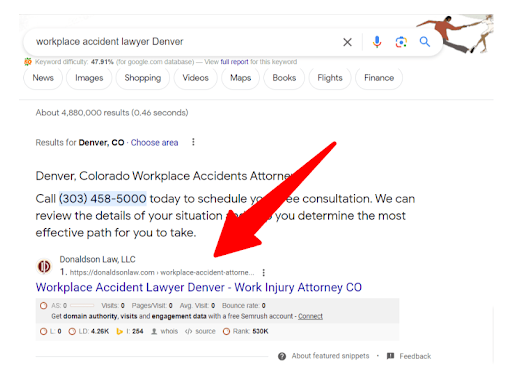
We’re excited to highlight another remarkable SEO achievement for our client, Donaldson Law, LLC. The firm has secured the top Google ranking for Workplace Accident Lawyer Denver through strategic SEO efforts. The primary factors contributing to this achievement include enhanced search visibility, targeted keyword optimization, improved click-through rates, and a strong focus on local SEO. This accomplishment highlights our proven ability to assist law firms in attracting more clients through organic search.
Using AI Tools to Execute SEO for Law Firms
Integrating AI tools into your SEO workflows empowers your law firm to research, create, and optimize content efficiently and effectively.
AI for Legal Keyword Research and Topic Discovery
AI-powered platforms analyze vast search data to identify emerging keywords, questions potential clients ask, and gaps in the competition’s content. This ensures your SEO targets the most valuable and relevant search terms.
AI-Assisted Content Briefs, Outlines, and On-Page Optimization
From drafting compelling blog posts to optimizing headers and metadata, AI tools help streamline content creation while maintaining quality. This allows law firms to produce more content faster without sacrificing expertise or relevance.
AI for Monitoring Rankings, Traffic, and User Behavior
AI-driven analytics platforms provide deeper insights into how your SEO efforts are performing and where adjustments are needed. Predictive analytics forecast trends, enabling proactive strategy shifts for continual growth.
Future-Proofing SEO for Law Firms in an AI-First World
Combining traditional SEO, AEO, and AI-driven strategies will be the hallmark of law firms that thrive in an AI-first search landscape.
Combining Traditional SEO, AEO, and AI SEO for Law Firms
While keywords, backlinks, and technical SEO remain foundational, optimizing for AI search means emphasizing content clarity, comprehensive answers, and structured data. Integrating these components creates a balanced, future-ready SEO strategy.
How Growing Law Firms Get Chosen by AI, Not Just Ranked in Google
AI-powered platforms prioritize trustworthiness, expertise, and user satisfaction. Law firms that demonstrate real-world legal experience, authoritative content, and responsiveness to user queries will be favored. This means the new SEO frontier is about becoming the most useful legal resource that AI tools want to recommend.
Attorney Marketing Network's Specialized SEO Services for Your Practice Area
At Attorney Marketing Network, we don’t believe in a one-size-fits-all approach. We provide specialized SEO services for lawyers with strategies tailored specifically to your area of law and target market. We understand that the client journey for someone seeking a personal injury attorney is vastly different from that of someone needing immigration counsel.
Our goal is to increase your online visibility, attract qualified leads specific to your expertise, and help your law firm achieve higher search rankings for the cases you want to take on.
Our tailored strategies enhance online visibility and attract potential clients across various legal fields:
- SEO for Personal Injury Lawyers
- SEO for Bankruptcy Lawyers
- SEO for Criminal Lawyers
- SEO for DUI Lawyers
- SEO for Employment Lawyers
- SEO for Family Law Lawyers
- SEO for Immigration Lawyers
We combine deep legal marketing experience with data-driven SEO tactics to ensure your firm connects with the right clients at the right time.
Start Your Legal SEO Journey with Attorney Marketing Network and Get Your Free Website Audit Today
Navigating SEO for the first time can be daunting for lawyers and law firms. While it is certainly a skill that can be acquired, most firms may struggle to execute effective SEO campaigns right out of the gate.
The best course of action is to seek assistance from an experienced SEO company that has a track record of implementing successful strategies for law firms.
At Attorney Marketing Network, we’ve got over 15 years of experience in the legal industry, and we’ve seen a lot of changes. We’re proud to have been nominated for the Inc. 5000, and our 5/5 star ratings on Google and Yelp speak for themselves. We believe in strong communication and no long-term contracts, because we’re confident in the results we deliver.
Let us help you get found in your targeted region. You can even book a free audit with us to see where you stand. We’ve achieved thousands of top results for our clients, and we’re ready to do the same for you. Contact us today to discover how Legal SEO strategies can propel your law firm’s growth and secure more cases.






